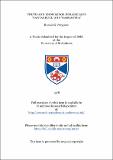Files in this item
Truth and knowledge in Rabelais's 'Pantagruel' and 'Gargantua'
Item metadata
| dc.contributor.advisor | Levi, Anthony | |
| dc.contributor.advisor | Supple, James J. | |
| dc.contributor.author | Ferguson, Ronnie | |
| dc.coverage.spatial | 241 p. | en_US |
| dc.date.accessioned | 2020-03-11T09:39:31Z | |
| dc.date.available | 2020-03-11T09:39:31Z | |
| dc.date.issued | 1978 | |
| dc.identifier.uri | https://hdl.handle.net/10023/19637 | |
| dc.description.abstract | The basic contentions of Truth and knowledge in Rabelais's "Pantagruel" and "Gargantua” are, first, that the theme of truth and knowledge underlies, unifies and gives meaning to all the disparate episodes of Books I and II and, second, that Rabelais went to great lengths to communicate his ideas on the theme of cognition in as tangible a way as possible to his general readers. This thesis is, thus, in effect, an attempt to restore the "incompatible" elements of ‘Pantagruel’ and ‘Gargantua’ to a status of equality. I hope to demonstrate that they are all interlocking and indispensible parts of a fictional pattern by means of which Rabelais stimulated his readers into exploring two broad areas of thought (the first mainly in ‘Pantagruel’, the second principally in ‘Gargantua’, though they overlap) basic to his conception of truth and knowledge. Unless it is derived from empirical information, from primary sources, knowledge is invalid. Second-hand, received "knowledge" -- no matter how impressive-looking, plausible or authoritative -- cannot be trusted to lead to the truth. One's senses are the foundation on which cognition is constructed. Omniscience and hence absolute truth are fatuous concepts. Their monolithic perfection is only tenable when critical reason and individual judgement are suppressed. They are ultimately -- in those who profess them -- the offspring of self-love. Partial knowledge and relative truth are, however, accessible to the individual who exercises his critical reason (which means unbiased by "philautie") on the raw material of first-hand information. This implies the mutual co-existence and compatibility of many relative truths —for the divergence in judgement stems from the infinite variety of temperament. For Rabelais the absolute, unilateral assertion does net do justice to the multifariousness of reality. To it he opposes a philosophy of duality : by operating a reconciliation or fusion of opposing but relatively true viewpoints -- thus transcending the purely individual judgement -- Rabelais attempts to arrive at a closer approximation to Truth. | en_US |
| dc.language.iso | en | en_US |
| dc.subject.lcc | PQ1694.F3 | |
| dc.subject.lcsh | Rabelais, François, ca. 1490-1553?. Pantagruel--Criticism and interpretation | en |
| dc.subject.lcsh | Rabelais, François, ca. 1490-1553?. Gargantua--Criticism and interpretation | en |
| dc.subject.lcsh | Truth in literature | en |
| dc.subject.lcsh | Knowledge, Theory of, in literature | |
| dc.title | Truth and knowledge in Rabelais's 'Pantagruel' and 'Gargantua' | en_US |
| dc.type | Thesis | en_US |
| dc.type.qualificationlevel | Doctoral | en_US |
| dc.type.qualificationname | BPhil Bachelor of Philosophy | en_US |
| dc.publisher.institution | The University of St Andrews | en_US |
This item appears in the following Collection(s)
Items in the St Andrews Research Repository are protected by copyright, with all rights reserved, unless otherwise indicated.

